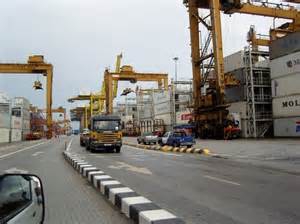Sea Freight To and From Iran Getting Under Full Sail
7 Apr 2016

Sea freight to Iran just got saw the engine rooms of trade get some extra fuelling, with the signing of a highly significant joint agreement between the Islamic Republic of Iran Shipping Lines (IRISL) and Singapore’s Pacific International Lines (PIL).
This cooperative venture could mean important developments in tanker services, in particular for international shipping of oil based products and petrochemicals not only to and from East Asia but even West African ports. If Rouhani’s plans to diversify the economy succeed, then exports from Iran via ocean going freight shipping could also include for instance manufactured materials, such as cars, should the industry become privatised and raw mineral products.
The head of IRISL, Mohammad Saeidi has been quoted as saying that their current fleet includes “160 container vessels, dry bulk carriers and tanker ships with a capacity of over 5 million TEUs”. Saeidi says, however, that the company plans to expand capacity given that sea freight is an economical form of international shipment.
IRISL wants to forge alliances with top global shipping container operators currently dominating the world’s busiest trade routes. Joint ventures could include the sharing of vessels, networks and port calls. European companies have expressed an interest in transfer of scientific expertise and technology, container vessel rental, ship-building, off-shore services and logistics.
A recent example of this expansionist ocean transportation strategy came in the signing of a Memorandum of Understanding signed between IRISL and a German Company, PWL, which specifically establishes a joint-venture shipping company.
In Hamburg, Germany, PWL’s Chair of the Board and the C.E.O. of IRISL signed this MoU, which offers Iran increased import and export business opportunities via a number of cargo services for IRISL and its subsidiaries’ fleets in Northern European ports, including in Germany, the Netherlands, and Belgium starting this month.
This means that customers of both PWL and IRISL will benefit from increased international transportation options, particularly when the final hurdle around transport insurance is resolved.
Robert Hvide Macleod, CEO of Norway’s Frontline shipping company, one of the world’s leading tanker firms, recently commented that obtaining insurance for e.g. oil cargo from Iran could still take another few months to clear, meaning that exports from Iran cannot be expected to see an uptick until Summer.
Frontline’s chief executive, apparently informed investors:
“We have not lifted anything yet, there are still terms of insurance and payments. There are still some outstanding [issues]. [But] we expect that to be in place within two to three months.”
MacLeod also added that he believe that once insurance issues get resolved, Iran will rely more on international shipping, an intention endorsed by Tehran on numerous occasions in the past couple of years.
In the lead up to the lifting of sanctions, Iranian tankers have been reported as sitting in Iranian ports, holding unsold oil due to a current lack of land storage facilities. This will no doubt be another opportunity for joint ventures with Russian and Chinese partners to develop infrastructure needed to rebuild Iran’s key oil export base, which in turn can only benefit the on-going developments in international freight transport and forwarding capacity within Iran.

our contact form.
The White Rose Group looks forward to hearing from you.



